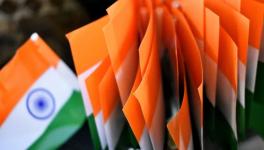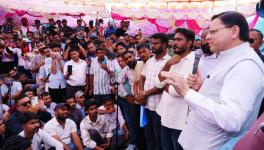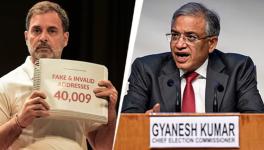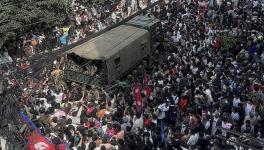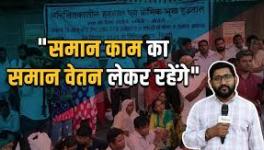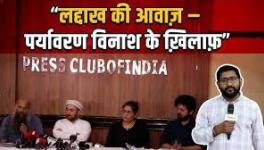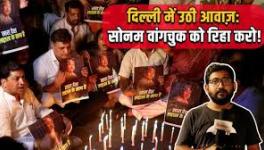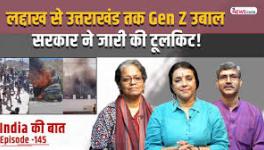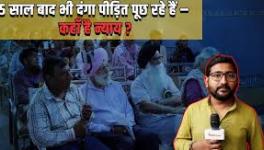NRC and CAB: ‘Cleansing’ Projects that Must be Opposed
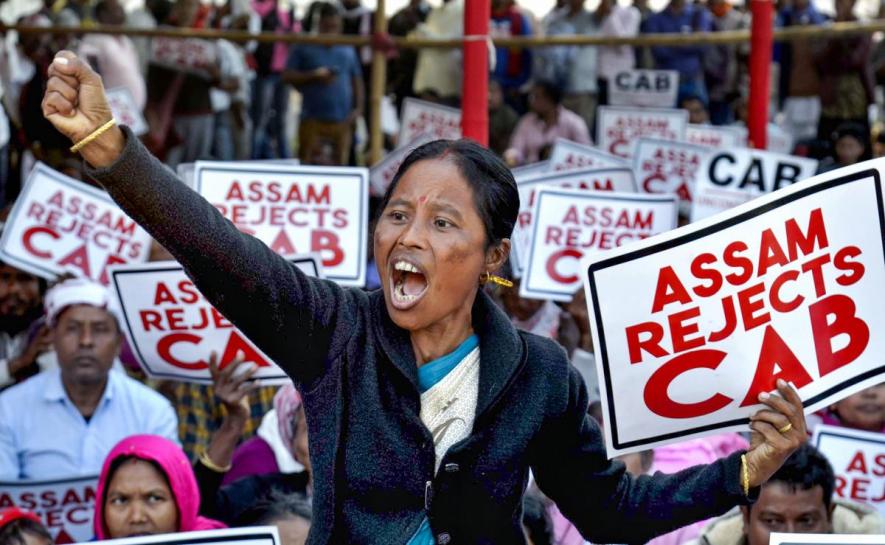
Representational image. | Image Courtesy: Deccan Herald
The 17th Lok Sabha passed the Citizenship (Amendment) Bill on Monday by an overwhelming 311 votes in favour compared to 80 against, immediately inflaming the northeast and other parts of the country. Rajya Sabha also passed the Bill, 125 votes to 99, on Wednesday. It now has presidential assent to become one of the most iniquitous Acts of Parliament.
The basic aim of the Act is to facilitate the citizenship for Buddhist, Christian, Hindu, Jain, Parsi and Sikh immigrants from Afghanistan, Bangladesh and Pakistan. Essentially, as is obvious from these lists, it seeks to facilitate the grant of citizenship to Hindu immigrants, but not Muslim ones, mainly from Bangladesh. To achieve this aim it seeks to amend some provisions of the Citizenship Act of 1955. Primarily, it reduces the clause which mandates that an applicant for citizenship has to be resident in India for 11 of the past 14 years to five years.
It also proposes to change the cut-off date for eligibility: with the passage of the law, all those who entered India before 31 December 2014 will be eligible to apply for citizenship.
In the BJP’s exclusionary and majoritarian vocabulary, thus, Muslim immigrants are ‘infiltrators’ and Hindu immigrants are ‘refugees’, fleeing persecution. This conception violates Article 14 of the Constitution, which guarantees as a fundamental right that the ‘State shall not deny to any person equality before the law or the equal protection of the laws within the territory of India’. Note the phrase ‘any person’, which does not mean ‘citizen’.
Now that the CAB has been passed, India has taken a huge stride towards the creation of a theocratic, exclusionary “Hindu rashtra”, the ultimate political goal of the Rashtriya Swayamsevak Sangh, also adopted by the BJP, in keeping with the very logic of the subordination of the latter to the former organisation. The Indian government is now engaged in a race to the bottom with countries like Pakistan and Saudi Arabia. As Congress Member of Parliament Shashi Tharoor had foreseen, this year’s electoral triumph for the BJP is pushing India relentlessly in the direction of a “Hindu Pakistan”.
By doing so, the CAB also flies in the face of the Preamble to the Constitution, which says that the people of India have solemnly resolved to constitute India into a “sovereign socialist secular democratic republic”. The word secular was introduced in the Preamble through a constitutional amendment—the 42nd; this government has destroyed that without having to amend the Constitution.
The only recourse after the passage of the Act will be a challenge in the Supreme Court. But given the judicial drift noticeable in recent times, only the most unreconstructed optimist would rely on it. The drift towards majoritarian authoritarianism, taking the form of a creeping Emergency, has been in evidence ever since the Narendra Modi government came to power. It has taken the form of attacks on Muslim and Dalit livelihoods, vigilantism against Muslims and the constriction of space for Muslims in the formal political space, for instance, by denying Muslims tickets in Lok Sabha and state Assembly elections.
The BJP’s return to power with an increased number of seats in the Lok Sabha—303—has further emboldened it in the sense that it does not even feel that it must pay lip service to core constitutional values. Thus we have the CAB, the National Register of Citizens (NRC), the war on Kashmir, and the rhetorical excesses of top leaders of the BJP. Let us recall what then just BJP president Amit Shah had said in this year’s election campaign: Referring to Bangladeshi immigrants, he had said on 11 April that they were termites eating “our” grain, taking “our” jobs, and that they would be thrown out. What “our” means in this context is anybody’s guess. Having been rewarded with the prize of the Union home minister’s job for his provocative demagoguery, he now has the power to do so. If he can.
This bring us to the BJP’s push for a National Register of Indian Citizens (NRIC), inextricably linked to the CAB, which is actuated by the same singular, mediaeval, obscurantist motive: driving Muslim, mostly Bangladeshi, ‘infiltrators’ out of India. This purpose has been enunciated and iterated by Shah.
The problem with the NRIC is that it will be impossible to implement it without the active cooperation of state governments, whatever the BJP might want and whatever diktat New Delhi might issue. As for driving every ‘infiltrator’ out of the country by 2024, as promised by Shah on 2 December 2019, we have heard that before. LK Advani made that ringing commitment when he became deputy prime minister and Union home minister in 1999. Prime Minister Narendra Modi, too, in 2014. We have not seen many people being shipped back to wherever they came from. Possibly because the task is both massive in scale and difficult to implement. India’s governmental capacities, not even geared to enforce traffic rules, are not up to it.
Some BJP leaders have tried to justify the NRIC, as opposed to threatening to ram it down the nation’s throat, on the grounds that the Citizenship Act of 1955 already provides for a National Population Register (NPR). Work on that made substantial progress alongside the enumeration for the 2011 decennial Census. The problem with this argument is that the NPR was only mandated to register the names of ‘usual residents’. A ‘usual resident’ is defined by the Act as “a person who has resided in an area for the past six months or more or a person who intends to reside in an area for the next six months or more”.
This was just an exercise in documentation and enumeration. There is, or, at least was, no ulterior objective. The BJP and the central government wants to use the NPR as the basis for creating an NRIC, which will form the basis for the expulsion of “infiltrators”—refugees, actually—by rendering them ineligible for citizenship. The credulous or communal might, of course, argue that there is nothing wrong with driving out people who do not belong to the country. They can be answered with one word: Assam. We know how the NRC panned out there. The number of people resident in Assam but excluded from the register was just over 19 lakh (1.9 million), amongst whom are a large number of Bengali-speaking and Hindi-speaking Hindus. Not expecting this outcome, the BJP, originally an enthusiastic champion of the NRC, turned against it.
It is not very clear how the NPR can form the basis for the NRIC as a section of the BJP is claiming it will. The two lists have completely different objectives and parameters. If every “usual resident”, as defined by the Citizenship Act, 1955, gets into the NRC, the latter ceases to be a sinister document that aims to drive out of the country people who have been living here for decades and a massive number of people who have, in fact, been born in India. The inequity and dark majoritarian nightmare that lies at the heart of the NRC and the CAB, and the project of “cleansing”, must be opposed.
In the BJP’s jejune vision, whatever inequities may be heaped on Hindus through the institution of a nationwide NRC, as has happened in Assam, will be balanced out by the CAB, a blatantly unconstitutional, and in that sense illegal, piece of legislation, as we have seen.
Unfortunately, the BJP, in its patently anti-‘intellectual’ fashion, has neglected its Indian Sociology 101. If it had not, it would have known that in many parts of India social contradictions do not rest on religious divisions, but ones based on language, ethnicity and other forms of sociocultural identity. Throughout the northeast, for instance, the principal social cleavages are based on language and ethnicity, not religion.
This, in turn, means that almost all of the northeast, now dominated by the NDA, is, nevertheless, violently opposed to the law. This, and widespread opposition to the NRIC, could ultimately result in the defeat of the BJP and Union government’s mediaeval and obscurantist designs. Outside Parliament.
Suhit K Sen is an independent journalist and researcher. The views are personal.
Get the latest reports & analysis with people's perspective on Protests, movements & deep analytical videos, discussions of the current affairs in your Telegram app. Subscribe to NewsClick's Telegram channel & get Real-Time updates on stories, as they get published on our website.









